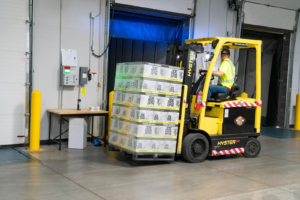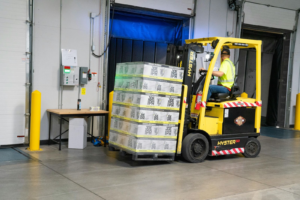Why Port Operators Should Eye Sustainable Returns Strategies

Running a port is no walk in the park. After all, you’re juggling countless responsibilities – maritime traffic, regulatory compliance, and global trade demands – all while navigating growing environmental pressures.
Sustainability isn’t just a buzzword anymore; it’s a business reality. And one of the most promising strategies for port operators? Investing in innovative reverse logistics solutions.
But why? Isn’t “reverse logistics” just jargon for fetching returns? Not anymore. It’s a game-changer – economically, ecologically, and operationally. Let’s explore what this means for port operators and why engaging in sustainable returns is the new gold standard.
Why Reverse Logistics Matters
Reverse logistics is essentially flipping the traditional supply chain on its head. Instead of goods flowing one way – from supplier to end consumer – it focuses on moving products, parts, or packaging back up the chain for reuse, recycling, repurposing, or proper disposal.
Take the example of minimizing container journeys. A container returning with unused materials instead of heading back empty doesn’t just save money – it slashes carbon footprints significantly. For ports, managing these processes thoughtfully can mean anchoring themselves as sustainability champions while optimizing operations.
According to Radial, reverse logistics provides methods for optimizing product return logistics, enabling businesses to turn returns into future-friendly opportunities. The benefits? Reduced waste, enhanced cost management, and improved customer relationships – a win-win-win.
Why Port Operators Should Eye Sustainable Returns Strategies
Sustainable returns strategies empower port operators to align goals with reality, minimize waste, streamline processes, and win over regulators and customers, creating value for businesses, customers, and the environment.
1. Align Goals with Reality
First, let’s talk about sustainability mandates hitting the global supply chain. Countries are tightening regulations around emissions, waste, and resource usage.
Whether we like it or not, these goals are now baked into business strategies. Port operators have to step up their game. A business-as-usual mindset won’t cut it anymore.
That’s where robust reverse logistics practices play their ace card. Beyond being an ‘end-of-line’ logistical task, reverse logistics now powers emission reduction efforts and waste minimization. But it also transforms returns into economic opportunities. It’s practically a two-for-one deal.
2. Reduce Waste and Environmental Footprint
We’ve all seen news clips of colossal container ships docking port side – it’s mesmerizing! But here’s the ugly truth. These giants bring with them enormous carbon footprints and massive amounts of waste, particularly unsellable or unsustainable goods.
With sound sustainable return logistics systems in place, you’re not only managing shipborne goods effectively but also reducing environmental impacts while identifying ways to reuse materials. It’s about turning waste streams into revenue streams. And who can argue with that?
3. Win Over Regulators and Customers
You know what they say – the early bird gets the worm. By embedding reverse logistics solutions early, port operators not only ace compliance mandates but also build stronger partnerships with eco-conscious clients.
Brands are increasingly scrutinizing every link in their supply chain for sustainability. Partnering with a port that prioritizes innovative green logistics will earn you brownie points with those clients who care about keeping their emissions low.
And don’t forget, customers notice too. The future of global trade won’t just be measured in profit margins; it’ll be measured in carbon footprints. Ports that change their tune today will lead the industry’s green revolution tomorrow.
It’s Time for a Change!
It’s time for a fresh perspective for port operators. Reverse logistics isn’t just a necessary evil for unchecked consumerism; it’s an opportunity to innovate, optimize, and contribute to a greener, more profitable industry.
The tides are turning, and only those willing to steer their ships toward sustainable horizons will thrive. Take the first step. Transform returns into opportunities for economic gain and environmental good.
![]()
The post Why Port Operators Should Eye Sustainable Returns Strategies appeared first on Container News.
Content Original Link:
" target="_blank">


























































